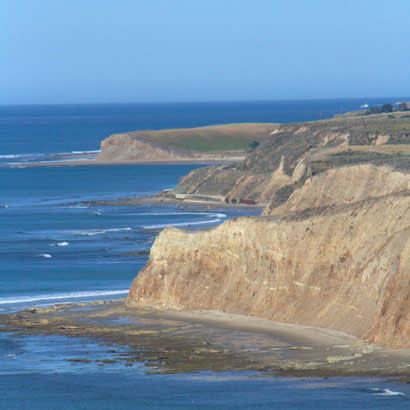
Two miles from Gaviota State Park beach, just west of Santa Barbara, California, sits Hollister Ranch, a gated community that’s one of the last large holdings of property along the California shore. State legislation required public coastal access as a condition for property owners to build houses. Three decades later, the public remains unfairly and illegally shut out. The state attorney general and property owners behind closed doors have proposed selling out the public. Fortunately, a state court judge has ordered a hearing to allow the pubic to take a stand to free the beach. The proposal would restrict public access to a life-threatening three-mile ocean route, except for small groups of children each year.
The City Project, GreenLatinos, and California League of United Latin American Citizens (LULAC) oppose the settlement agreement and support equal access to the California coast. The proposed settlement is illegal, unfair and inadequate, especially for people of color and low-income people who have limited or no access to the beach and coastal zone. These communities disproportionately lack access, are harmed by sea level rising and climate change, are deprived of coastal economic benefits, and are ignored or marginalized by the state.
“I grew up in Chicago, near Lake Michigan, and I was at the beach all the time for barbecues, swimming, hanging out,” says Yvonne Gonzalez Duncan, director of California LULAC. “In California, I live a mile from the beach and love lots of bonfires and fun for my family. All children and their families and friends have a right to beaches and trails along the coast.” LULAC is one of the largest and oldest Latino civil rights organizations in the nation.
“Growing up near the beach in Southern California, I always had the sense the beach is for everyone,” says Mark Magaña, executive director of GreenLatinos.“Free access is a great equalizer for everybody to enjoy the beach with their family and find solace. Taking that right away and making the beach a privilege for the few is the antithesis to how I grew up, and to our natural right to enjoy the wonders of nature equally without barriers to access.” GreenLatinos is a national network of Latino environmental, health and social justice leaders.
The “Gang of 100” — representing millions of Californians all over the state, from inland and urban residents to rural coastal dwellers — supported coastal justice in public comments to the Coastal Commission in January 2016, bringing together social justice and mainstream environmentalists. The Commission ignored them then, and the state ignores them now. When the court ordered the parties to provide public notice of the proposed settlement, the Coastal Commission and Coastal Conservancy should have reached out to the people they know care about coastal justice. Instead, the parties published an obscure notice in the Santa Barbara Press-News. Who reads that? People of color, low income people and other coastal supporters statewide generally don’t.
Hollister Ranch property owners have fought for decades to prevent public access. They bullied the federal government from making the Gaviota Coast a unit of the National Park System because of strong opposition from study area landowners. Now they are bullying the state to surrender the peoples’ right to reach the beach under terms the YMCA obtained in 1980 that provide road access to a 3,880-foot stretch of beach on Hollister Ranch.
The California Coastal Commission has traditionally refused to address environmental justice. For that reason, California amended the Coastal Act in 2016 to make clear that equal access and coastal justice are integral to coastal protection. The proposed settlement does not comply with these coastal justice standards. The attorney general traditionally defends agencies against environmental justice claims, rather than protect the public.
Over 1,500 people have submitted comments, most against the proposal. It’s easy to see why. The state largely limits public access to the beach to life-threatening three-mile trips via kayak, surf board, paddle board and soft-bottomed boat — with a return trip required the same day to prevent overnight stays. Sea, wind and weather conditions on the Gaviota Coast can change rapidly without warning, especially in the afternoon. Professional kayakers warn against even trying this trip. The attorney general, commissioners and property owners should personally kayak this route to back up their claim that it’s good enough for the people.
Wealthy property owners filed a class action lawsuit several years ago against the California Coastal Conservancy and Coastal Commission to limit public access to the beach. The action moved along largely in secret until the court ordered the parties to provide notice to the public of their proposed agreement.
“This proposed settlement was conceived and executed behind closed doors,” says Marc Chytilo, an attorney for the Gaviota Coastal Trail Alliance, in the state court case of Pappas v. California Coastal Conservancy. The court has set a hearing on the Alliance’s motion to intervene on August 20, and a fairness hearing on the proposed settlement on September 10, 2018.
The City Project, GreenLatinos and California LULAC support the Alliance, and are organizing non-traditional allies to make clear that the beach does not belong to private property owners, state agencies, and mainstream environmentalists. Free the Beach!
*Named members of the Gaviota Coastal Trail Alliance include the Gaviota Coast Conservancy, the Santa Barbara County Trails Council, Coastwalk/California Coastal Trail Association and the California Coastal Protection Network
Watch this short stop-motion video by Sam Garcia:
Robert García is the Founding Director of and Counsel for The City Project, a nonprofit environmental justice and civil rights organization based in Los Angeles.


